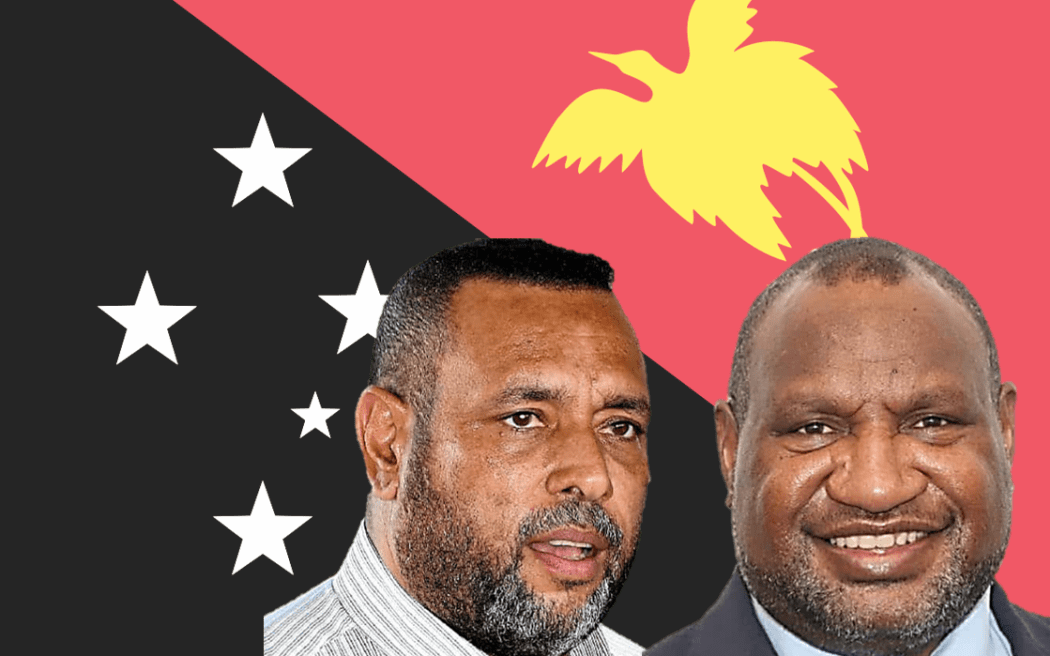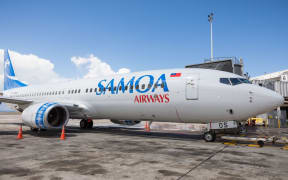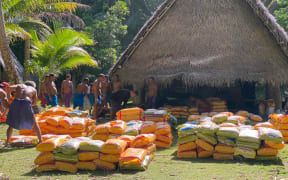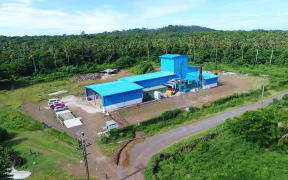
Allan Brid, left, and James Marape Photo: RNZ Pacific
Papua New Guinea - threat
PNG's East Sepik Governor Allan Bird says he does not make claims without evidence, and what he wrote over the weekend is no different.
Prime Minister James Marape has called on Bird to provide proof for his claims, which include threats to his life.
The Post-Courier reported Bird responding to the PM's request to reveal the identity of the Deputy Police Commissioner who provided him with the information.
Bird said he thinks there are obvious reasons why he cannot divulge such information publicly.
He also said the senior ministers who provided him with information do not want their identities to be revealed, out of concern for retribution from the government's inner circle.
Palau - compact
Palau's president says the sign-off of its compact of free association with the US came "just in time".
On Friday, the US Senate passed a funding package that provides US$7 billion over 20 years for the Compacts of Free Association countries. It was then signed off by president Joe Biden.
Palau President Surangel Whipps Jr told Voice of America on Monday the money allows them to stop borrowing.
"It's not October 1st, but it's at least within this fiscal year. And really, just in time," he said.
"[This] allows us to stop borrowing to keep government operations going; it allows us to hire those critical police officers, health care workers and education teachers that we need."
Whipps said he recently met with investors from Singapore and Japan, as well as United Airlines with a request for direct service to Japan.
He said now that COFA is funded, he can promise a stable and secure environment to financiers.
"[It's important that we're] opening up new markets so that we're diversified and more resilient, not so dependent on the Chinese tourism, which could be weaponized."
Fiji - minority
Fiji Prime Minister Sitiveni Rabuka says he has the welfare of minority communities on his priority list.
For the Banaban people on Rabi Island this would be significant, with a review planned of the Banaban Settlement Act.
The Fiji Times reports he is also promising elections to restore the Rabi Municipal Council which was suspended by the previous government, with an administrator appointed in his place.
Rabuka is also planning to complete naturalisation processes for Rabi and Kioa islanders.
He said the measures are part of the coalition government's commitment to empowering local communities.
The Banaban community was moved to Rabi by Fiji's British colonial masters following World War Two after their Kiribati island of Banaba had become largely unliveable due to destructive phosphate mining.
That phosphate is spread across the farms of Australia and New Zealand and the people who remain on Banaba are seeking to have both governments recognise their responsibility for the destruction of their homeland, and to assist with rehabilitation.
Cook Islands - plastic
A NZD$10 million project in the Cook Islands is aiming to reduce single-use plastics.
It follows an environmental workshop hosted by the National Environment Service and Te Ipukarea Society.
The Cook Islands News reported the hospitality sector is set to reduce the number of plastics being imported for the food and beverage industry.
According to a Cook Islands 2020 Waste Audit, 1.5 million plastic bottles were imported in the one-year report period.
Plastics made up 94 per cent of the total waste stream in the Pa Enua hospitality sector, with 13 per cent of Rarotonga and 20 per cent of Aitutaki households.
Niue - roads
Engineers from China have now started the work to repair and upgrade the roads on Niue.
The Niue government had been seeking to repair the roads at the time of the country's fortieth anniversary in 2014, and as it now approaches its 50th, that work is underway.
The island's finance minister, Crossley Tatui, says China is providing a grant of NZD$18 million for the work, with Niue putting up NZD$5 million.
Marshall Islands - nuclear
The president of the Marshall Islands wants the United States to be held to account for nuclear testing in the Pacific.
Hilda Heine told Japan's Asahi Shimbun news the US should be held responsible for cleaning up radioactive contamination and protecting the health of islanders affected by its nuclear testing.
The US conducted 67 nuclear tests in the Marshall Islands between 1946 and 1958.
She said her country cannot afford the massive cleanup costs, and its medical system falls short of being able to take care of the many cancer patients apparently linked to the nuclear testing.
President Heine also had some harsh words regarding treated radioactive water being discharged into the Pacific Ocean from the Fukushima nuclear power plant, which experienced a triple meltdown following the Great East Japan Earthquake and tsunami in 2011.
The Marshall Islands Parliament adopted a resolution expressing "grave concerns" over the discharge program in March last year, months before the first batch of filtered and diluted wastewater was released in August.





